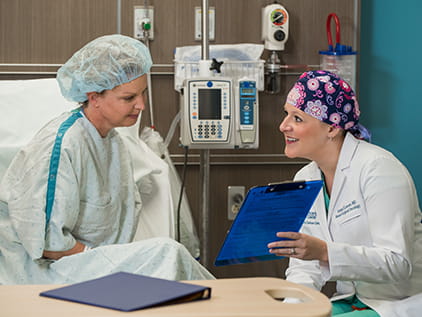Gastrointestinal Surgery
Gastrointestinal surgery refers to the procedures and treatments that doctors use to address problems with the esophagus, stomach and bowels. When lifestyle changes and medicinal treatments are not enough, surgery may be required.
The gastroenterology doctors and medical specialists at The University of Kansas Health System are recognized leaders in their field and provide experienced and compassionate care. Our interdisciplinary approach puts your health and quality of life first.
What is gastrointestinal surgery?
Gastroenterology is a medical discipline that focuses on issues with the digestive system. This can include the esophagus, the stomach, the small intestine and the colon (also called the large intestine). Taken together, these organs are often referred to as the gastrointestinal (GI) tract.
Gastrointestinal surgery refers to a range of different procedures that are used to treat disorders such as inflammatory bowel disease, severe acid reflux and other disorders of the gastrointestinal tract, including cancer.
Because gastrointestinal surgery covers a variety of organs and conditions, the specific types of procedures can vary based on your diagnosis. In general, gastrointestinal procedures typically involve the removal, bypass or modification of the digestive tract.
We offer a variety of appointment types. Learn more or call 913-588-1227 to schedule now.
Who can have gastrointestinal surgery?
Often, lifestyle modifications can be used to treat issues that arise within the GI tract while medicine can be used to effectively treat more severe conditions and disorders. However, for some people, surgery is necessary.
Some disorders that GI surgery treats include:
- Colon cancer
- Esophageal disorders
- Hepatobiliary disorders
- Inflammatory bowel disease
- Liver disease
- Obesity
- Pancreatic cancer
Those who suffer from severe conditions that impair the body’s processing of food and waste may be considered for surgery. Gastrointestinal procedures may also be an option for those whose weight has put them at risk for other diseases such as hypertension or diabetes.
How does gastrointestinal surgery work?
There are many types of gastrointestinal surgery, each of which is specialized to treat particular conditions in your digestive organs. Some of the most common types of gastrointestinal surgery include:

Cancer care you can count on
The University of Kansas Cancer Center is 1 of fewer than 60 NCI-designated comprehensive cancer centers in the nation, and it's part of The University of Kansas Health System.
Benefits and risks of gastrointestinal surgery
People receive gastrointestinal surgery for a variety of reasons, sometimes to save their life. In most cases, the benefits of receiving this surgery outweigh the risks.
As with any surgery, risks of bleeding and infection are present during and after the procedure. In some cases, an organ may be partially or wholly removed and you will need ongoing treatments to replace the lost functionality.
In most cases, lifestyle modifications are required after gastrointestinal surgery. A healthy diet that promotes good digestion is an important part of those lifestyle changes, and regular medicinal treatments may also be needed.
What happens during gastrointestinal surgery?
Gastrointestinal surgery may be performed using an open or minimally invasive approach. The type of gastrointestinal surgery a doctor selects is based on the type of disorder being treated and your physiology.
Why choose us for gastrointestinal surgery
Some of the world’s leading robotic technology is used at The University of Kansas Health System. The da Vinci® Surgical System enables our surgeons to perform minimally invasive GI and pancreatic surgery with greater efficiency and precision than ever before.
As our patient, you'll receive the most advanced treatment options available. Our surgeons have been performing and refining minimally invasive gastrointestinal surgery since the early 1980s. They were among the first members of the Minimally Invasive Robotic International Association.




